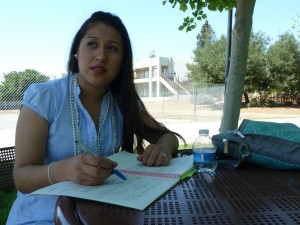Zarco says she hasn’t been able to get the classes she needs during the regular school year because of budget cuts. She’s so desperate that she took part two of an English class last semester and crossed her fingers she’d be able to do part one this summer.
Howard Ho shares her pain. He says he was so frustrated with the struggle to get classes at DeAnza College in Cupertino, 20 miles away, that he transferred to Evergreen.
“Time is money like everybody says, and I really want to move on to my career goals,” he says.
HELP FOR SOME, BUT NOT ALL
In some ways, though, Zarco and Ho are kind of lucky. A report the Public Policy Institute of California put out this spring shows that community colleges cut so many classes during the recession that 600,000 students weren’t able to take any at all. That’s especially true for recent high school graduates and older workers in need of retraining, according to Sarah Bohn, lead researcher of the report.
Summer classes took a particularly hard hit. At Evergreen, for example, the school slashed summer sections from nearly 200 in 2010 to 67 in 2012, says Vice President of Academic Affairs Keith Aytch.
Aytch says the decline is directly linked to state funding. Now that tax revenues are rolling in from the passage of Proposition 30 last fall, the school expects to have enough money to almost fully restore its summer offerings.
“The economy looks better for the state,” he says. “The governor is supporting community colleges, so hopefully we’ve turned the corner.”
A survey conducted by the California Community Colleges Chancellor’s Office found summer sessions all over the state are rebounding. At least a third of the state’s 112 schools are offering more courses this summer than last.
Paul Feist, spokesman for the chancellor’s office, says the trend is encouraging, but still not enough.
“This is not an indication that we are back to normal,” he says.
The influx of cash from Prop. 30 will accommodate only about 20,000 students, Feist says, less than 4 percent of those shut out.
“So, while we are adding students back, you can see we have a long way to go to make up for the ground that we lost,” he says.
BRINGING STUDENTS BACK
At Evergreen, math teacher Teck Ky says he plans to take extra students in his classes this summer to help as many as possible get back up to speed. Last year, the school cut half his courses, creating bottlenecks for dozens of students. Now, he’s back to a full load, plus one extra class.
Teaching summer courses is good for him, too. Instructors at some colleges get extra cash for summer sessions.
“Last year, [my kids] have to stay home and I had to create all the activities for them,” he says. “They didn’t like that. So this year I said, ‘OK, we can send you guys to summer camps because of the extra sections I’m going to be teaching.’ ”
There is some concern that classes won’t fill up. Aytch that says after years of cuts, students might expect summer to be a bust. If they don’t sign up, it will be. Empty classes usually get canceled.
“When you take away so many units, you lose the student,” Aytch says. “So you have to work harder to bring those students back.”
So, students in nearby high schools, colleges and those already enrolled at Evergreen during the regular year are getting hit with a ton of email blasts.
Student Becky Zarco says it seems to be working.
“The classes that I signed up for are pretty much on wait list already, so I’m pretty stoked for that,” she says.
The California Community Colleges Chancellor’s Office projects that as long as the economy keeps improving, colleges will add courses this fall, too.
Listen to Charla Bear’s story on The California Report.
 Recent reports show more than a half-million community college students have been shut out of classes over the past five years because of budget cuts.
Recent reports show more than a half-million community college students have been shut out of classes over the past five years because of budget cuts.